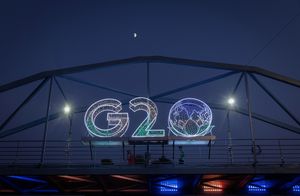The Global South, a hub of global dynamism, is poised to drive most of this century’s global growth. The International Monetary Fund forecasts affirm this shift, with over two-thirds of worldwide growth expected from the Global South. Home to 80 per cent of the world’s population, this region offers a growing labour force and investment opportunities abundant enough to shape the world’s economic landscape. However, these countries face disproportionate climate vulnerability, worsened by post-Covid recovery challenges, rising debt, and food and energy insecurity. Addressing these issues requires global effort and substantial financing, ensuring the Global South’s rise benefits all.
Recognising the Global South’s pivotal role, India’s G20 presidency echoes its aspirations, emphasising that development should not force countries to choose between alleviating hunger and protecting the planet. At its core is a human-centric vision balancing economic progress, environmental sustainability, and social well-being, calling for global cooperation and shared responsibility to leave no one behind. Prime Minister Narendra Modi, setting the tone for this presidency, envisioned it to be “inclusive, ambitious, action-oriented, and decisive”. Today, as we reflect on our journey, we can proudly say that it has lived up to those expectations. From climate diplomacy to economic growth discussions, India’s leadership demonstrated an unwavering commitment to the Global South, fostering consensus among major economies.
From the beginning, India advocated for the African Union (AU) to attain G20 permanent membership, bringing 55 African countries into the fold and making G20 representative of 80 per cent of the world’s population. Additionally, we extended an open invitation to countries such as Mauritius, Egypt, and Nigeria, alongside the African Union chair from Comoros and representatives from AUDA-NEPAD. In January, we hosted the first ‘Voice of the Global South Summit’, with 125 countries and 18 heads of state, discussing common challenges like energy security, justice, sustainable transition, and the food, fuel, and fertiliser crises. This inclusive approach enriches the forum’s diversity. India has remained dedicated to driving tangible economic progress in these regions by leveraging digital solutions and innovation. Our focus on digital public infrastructure (DPI) has been a pivotal part of that vision. So far, we have signed MoUs with eight countries to collaborate on integrating and innovating DPI components in their governance, allowing us to share our best practices for a digital revolution.
When it comes to climate action, India has stood firm in its commitment to climate justice and equity, calling for substantial support from the Global North. The New Delhi Leaders’ Declaration (NDLD) seeks an ambitious, transparent, and trackable New Collective Quantified Goal (NCQG) of climate finance, starting at $100 billion, by 2024. We have also urged developed countries to double their collective allocation of adaptation finance compared with 2019 levels by 2025. This comes on the back of a seismic shift in perspective. For the first time in history, major developed economies have recognised the monumental scale of resources needed—precisely $5.9 trillion by 2030—for developed nations to meet their Nationally Determined Contributions (NDCs). Moreover, an additional annual $4 trillion is needed to drive the adoption of clean energy technologies. This acknowledgment puts the colossal needs of the Global South in the spotlight.
Recognising this need for substantial financing, India has pushed for better, bigger and more effective Multilateral Development Banks (MDBs). Measures like currency exchange guarantees and disaster clauses in debt repayment are helping us rebuild an international development finance system capable of addressing the challenges facing developing countries. Our presidency has been transformative, not only in the climate arena but also in the development sphere. The NDLD presents an action plan for accelerating progress on Sustainable Development Goals (SDGs) and emphasises the importance of data for development. It also highlights food security and nutrition, especially through the promotion of millets and ancient grains.
In a world where faith in multilateralism is fading, the spirit of Vasudhaiva Kutumbakam—one earth, one family, one future—has succeeded in ushering in a renaissance for global cooperation. We have laid the foundation for a new era of global cooperation, one that is characterised by inclusivity, ambition, and a commitment to building a sustainable and equitable future for all. It is through the visionary leadership and global standing of Prime Minister Modi that forging consensus on these critical issues was possible. It has been a privilege to serve as his G20 Sherpa.
Kant is G20 Sherpa and former CEO, NITI Aayog. Views expressed are personal.


